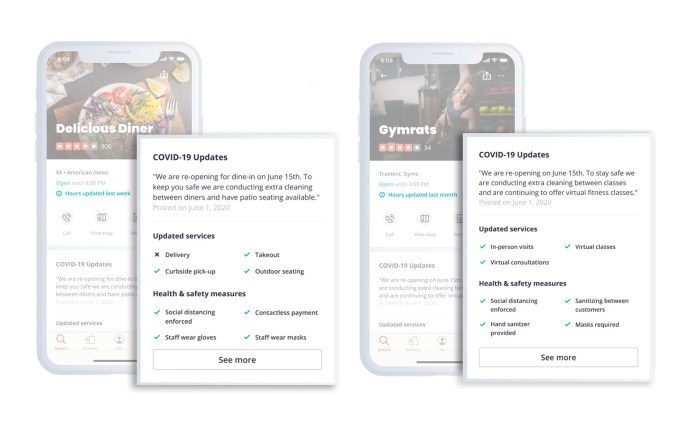Over the past few months, Yelp has been takin steps to help businesses reeling from the impact of the coronavirus pandemic — things like waived fees, virtual service listings and GoFundMe fundraisers (that last one had a mixed reception).
But without getting into the question of whether the United States is reopening at the right time in the right way, it’s clear that the reopening is happening, and businesses are going to need new tools to safely navigate the changing landscape. So Yelp is announcing two of those tools today.
First, it says it’s expanding on its COVID-19 banners with a full COVID-19 section on each business profile. So those businesses can indicate whether they’re doing things like enforcing social distancing, sanitizing spaces between customer visits, requiring that employees wear masks and/or gloves, requiring masks that customers wear masks and so on.
These updates will be timestamped. There can, of course, still be a difference between what the business promises and the reality in the store. But as a consumer, at least you’ll know how up-to-date those promises are.

Image Credits: Yelp
In addition, Yelp says it will use a combination of human moderation and machine learning to update these sections with information that businesses have posted elsewhere, like whether they offer curbside pickup or virtual services.
The company is also updating its waitlist feature, which restaurants may be turning to as a way to avoid long lines and crowds. Restaurants will now be able to print out a QR code that customers can scan to add themselves to the waitlist in a contactless way. Hosts will also be able to manually adjust wait times, and they’ll get alerts when they’re approaching legally-mandated seating capacities.
In a statement, Yelp’s head of consumer product Akhil Kuduvalli Ramesh said that the company’s response to the pandemic has broken down into two phases. During the first phase, “We helped businesses convey how they are updating their operating models and services they offered.”
He added, “In phase two, as people begin to reenter businesses, addressing the health and safety needs in the local marketplaces across the US is of paramount importance.”

